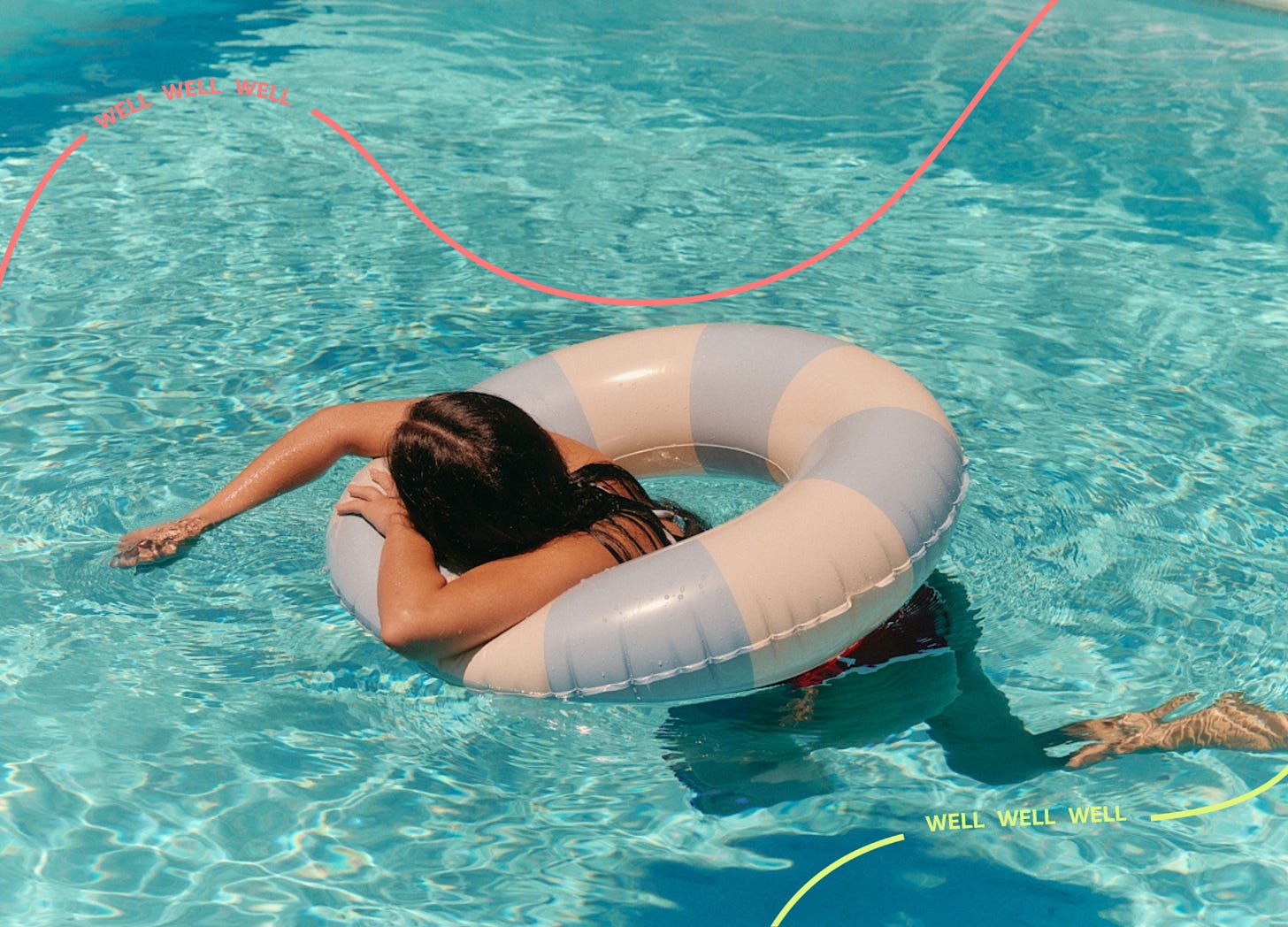How to relax when you can't relax
Why deliberate rest is sometimes the most productive thing you can do
Regular readers will know that, every summer, I take a six-week break from Well Well Well - and that’s starting next week.
If you’re a paid subscriber (thank you, I love you), payments will be paused/extended, so you won’t be paying for the next six weeks.
Of course, I’m not stopping work completely; I’m a freelance journalist with a mortgage to pay. I’m just taking a break from this weekly work - which I love, but which takes up a lot of brain space.
I must have read (and written!) a hundred articles about the importance of deep rest and restorative time. Without it, your cognitive function is impaired, leading to brain fog, forgetfulness, distractibility and difficulty in multitasking. Then there’s the physical impact, in terms of a stressed and imbalanced gut and weakened immune system.
Even though we know how important it is, it can be so hard to find the time to relax. And even when you do have time, it’s still really hard to relax fully, right?
So for this final edition before the summer break, I wanted to share some wisdom from Nicola Jane Hobbs, whose book The Relaxed Woman is out now.
You might have seen her viral Instagram post, which spoke to so many women in a very visceral way…
‘As I wrote The Relaxed Woman, I spoke with hundreds of women and explored the science behind our collective exhaustion,’ she says. ‘What I discovered is that we’re living inside systems and stories that make relaxing feel unsafe and undeserved.’
The good news is: there are ways to unlearn the thought patterns that don’t allow us to rest. But please don’t see ‘having to relax’ as another thing on your to-do list, or another source of pressure. It should feel good. And it’s important that the below advice is taken in the spirit of ‘ways to feel better’ - rather than simply more things that you have to remember to do.
Here are five of the biggest reasons why women struggle to relax - along with some ways to (gently) overcome them.
‘How can I rest when there’s so much to do and no one else to do it?’
We’ve all said this, right? Often, there are logistical and structural barriers in the way of our relaxation. ‘When the mental load is heavy and support is scarce, relaxation can feel out of reach,’ says Nicola. ‘From financial insecurity and overworking to caregiving and an unequal division of domestic and emotional labour, many of us are stretched thin by responsibilities.’
Try this: Start by weaving micro-rest rituals – such as taking five slow, deep breaths between tasks – into your day. This will offer moments of respite and interrupt the spiral of chronic stress that can lead to burnout.
‘I feel guilty for resting, like I’m being lazy and selfish.’
Nicola says that sociocultural norms are at play here. ‘We’ve been conditioned to prove our worth through productivity, self-sacrifice and emotional labour,’ she explains. ‘Since we were little girls, we learn that being good means giving endlessly, being lovable means pleasing others and being successful means overworking and striving for perfection. We’ve absorbed the manipulative cultural messaging that relaxation signifies laziness, indulgence, selfishness and complacency. Without seeing other women relax, we feel shame and guilt when our bodies need us to slow down.’
Try this: Let someone see you rest – break the cycle and relax visibly in front of your children, your partner, a colleague, a client, a friend.
‘Even when I stop, my mind is racing and can’t switch off.’
These are the neurobiological patterns that have you planning and worrying during that yoga class. ‘For many women, our nervous systems don’t feel safe enough for our stress responses to switch off,’ says Nicola. ‘After years of chronic stress, trauma or over-responsibility, our brains may interpret rest as a threat. Survival mode becomes our default. But, in the same way that experiences of stress have shaped our nervous systems, experiences of safeness, love and restoration can reshape them.’
Try this: Practise sending signals of safeness to your nervous system by softening your shoulders, grounding yourself (tuning into the sensations of the floor), humming softly or visualising a safe place in your mind.
‘I haven’t worked hard enough to deserve to rest.’
I just want to hug anyone who feels like this (starting with myself), which Nicola says is down to psychological beliefs and survival strategies. ‘Our inner critics are often loud, constantly telling us that rest is unproductive, indulgent and selfish,’ she says. ‘And many of us use people-pleasing and over-control as ways to help us feel accepted and loved. These survival strategies may have kept us safe as children but they come at a cost – disconnection, depletion and burnout.’
Try this: Offer yourself compassion when your inner critic is loud. Find a private space, place your hand on your heart and say out loud, ‘It is safe to rest. I am allowed to rest.’
‘Who am I if I’m not busy?’
Ah, the old existential identity crisis, I remember it well from maternity leave (indeed, I wrote a book to avoid it). ‘Busyness can become our identity,’ says Nicola. ‘It offers structure, distraction and a sense of control in a chaotic world. Relaxing brings us into contact with who we are beneath our achievements, caregiving and the roles we play. This can feel vulnerable and disorienting – but also beautiful and liberating.’
Try this: Visualise yourself as a relaxed woman – your most relaxed, authentic self; free from roles, 'shoulds’ and conditioning. What does she wear, how does she move, what does she know? What quirks and eccentricities, strengths and possibilities does she contain? How can you nurture her, express her and embody her?
I’m certainly going to be giving the above tips a go over the next few weeks, and I hope you manage to as well. If you’re going away, I’d suggest that The Relaxed Woman is the perfect holiday read. Here’s to a restful summer 🧡
This week I’m…
So grateful to everyone who’s sponsored me for what has become known as ‘this stupid bloody half marathon’. I’m dreading it (which I know is not the energy I advise you to bring to exercise), but it’s for an excellent cause, so please do consider chipping in if you can.
Dipping into the Well Well Well archive. In the past, I’ve stopped posting completely during my six-week break, but now I’ve been doing this for so long, there’s a wealth of content in the archive, so I’m planning to push out some classic editions between next week and September. Hope you enjoy!










